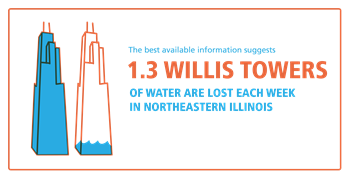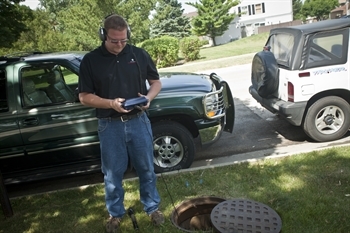
Emily Cikanek
Reducing leaks at every scale isn’t just about being green; it’s also about saving green.
Approximately 490 million gallons—that’s 1.3 Willis Towers—of treated Lake Michigan water are lost every week in the Chicago region. In other words, we have a lot of leaks. This week, it’s Fix a Leak Week, the U.S. Environmental Protection Agency’s (U.S. EPA) annual campaign to increase awareness about water conservation and efficiency. Water utilities around the country are sponsoring races, sending out leak detection tips and leading campaigns to help people and businesses reduce this waste of water and money. According to the U.S. EPA, household leaks nationally can waste enough water to supply more than 11 million homes for a year.

But reducing leaks at every scale isn’t just about being green; it’s also about saving green. In Metropolitan Planning Council’s (MPC) 2013 report, Immeasurable Loss, we focused on all those Willis Towers of water, the really big leaks that our local communities are trying to fix. This year, we’re continuing that work, and one of the ways we’re doing that is by focusing on improvements to the State Revolving Fund, the main source of funds for local water infrastructure repairs.
This ”Revolving Fund” provides loans to support public, nonprofit and cooperative water utility infrastructure improvements. Each state receives annual funding from the U.S. EPA, money that is then matched with state funds to form a perpetual source of low-interest financing paid back through loan repayments, bond proceeds and interest on loans. Unfortunately, President Obama’s 2015 budget proposes roughly $500 million in cuts to the SRF program.
In a time of budget crunches and scant funding, this is a key opportunity to match existing dollars with the projects that desperately need them.
Despite that cut, however, Illinois is in a unique position. Illinois’ program is managed by the Ill. Environmental Protection Agency (Ill. EPA). In October 2012, Gov. Patrick Quinn announced the Clean Water Initiative, expanding the amount of money available in the Revolving Fund by having the Ill. Finance Authority issue bonds against the loan repayments. This results in roughly $800 million in new loan money and the potential for more. This all sounds almost too good to be true, but it is true and it gives the state the opportunity to fund more (and different) projects than they have in the past.
Currently, Illinois’ Revolving Fund supports wastewater and drinking water infrastructure, providing $300 million and $60 million in fiscal year 2013, respectively. To go along with the Clean Water Initiative expansion, the state is also expanding through House Bill 4382 the types of projects that can be paid for with State Revolving Fund loans to include projects specifically focused on stormwater management.
Additionally, the rule changes for Lake Michigan water users that were the focus of the Immeasurable Loss report and roundtable were just posted to the Illinois Register for a first round of public comment. The main changes relating to how water loss is defined will result in more communities having a better idea of just how much water and money they’re losing through leaks, poor billing practices and other waste.
In a time of budget crunches and scant funding, this is a key opportunity to match existing dollars with the projects that desperately need them. It’s time to align State Revolving Fund priorities to help those communities fix their systems and meet the new regulatory requirements.
With the new influx of money, as well as potential for new program alignments, we have—right now—a huge opportunity to improve Illinois’ Revolving Fund and allow more communities access to the low-interest funds. Slowly but surely, the Ill. EPA has been making incremental improvements to the loan program, including implementing a more automated computer tracking system, streamlining and rewriting application requirements, switching to a rolling application timeline, improving loan disbursement processing procedures and working with a financial consultant to make even more changes. But even with the Clean Water Initiative expansion of the loan, it can still be difficult for some communities with serious infrastructure needs to get access to the funds.

An improved State Revolving Fund could mean more money for communities to invest in leak detection.
Emily Cikanek
MPC is working alongside the Metropolitan Mayors Caucus, Chicago Metropolitan Agency for Planning and other organizations to help Ill. EPA make changes that will make all this additional loan money more available to the communities that need it. By providing opportunities for broad stakeholder feedback, we are hoping to help Ill. EPA streamline their application process, improve their project selection criteria to reward communities that are being particularly innovative or sustainable and take advantage of the rules allowing program money to go toward infrastructure audits and planning. The money is there, and so is the need. Let's take Fix a Leak Week to the next level.